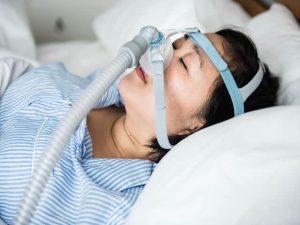What is Sleep Apnea?
It is a disorder of breathing while sleeping which creates pauses in breathing or even total cessation of breathing. These events happen repeatedly and during the sleep cycle and can last from 1 second to hours. These pauses in breathing create a large number of temporary dips in blood oxygen levels, which is called apnea. You might have heard about people who die from their Sleep Apnea because it causes hypoxia, which leads to brain injury or death. This can be prevented by undergoing surgery or wearing a CPAP device during sleep.
Causes of Sleep Apnea
One of the most common causes of sleep apnea is being overweight. This problem is usually caused by a combination of an increase in soft tissues in the neck and throat and a corresponding decrease in muscle tone in those areas. The decrease in muscle tone results from a decrease in the production of serotonin and relaxin, which are neurotransmitters that help muscles relax. Excess fat deposits around the throat can also result in an increased risk of sleep apnea because they compress the windpipe and make breathing more difficult as you sleep.

Another cause of sleep apnea is a small hole in the upper part of the windpipe. The hole allows air to escape, which creates a constant flow of air through the airways. This flow of air through the airways causes the patient’s muscles to spasm. Some people are born with this small hole and others develop it over time due to head or neck trauma or certain types of surgery on their throats.
Symptoms of Sleep Apnea
The most common symptoms of sleep apnea are simply snoring and abnormally loud breathing that occurs at night. Sometimes the loud breathing is accompanied by restlessness or an increased heart rate and blood pressure.
Treatment of Sleep Apnea
Treatment for sleep apnea can include losing weight, using a CPAP device, and in some cases, undergoing surgery. Using a CPAP device is probably the most common treatment for sleep apnea that is used by patients with mild to moderate forms of the disease. The device is called continuous positive airway pressure and it requires that you wear a mask on your face while you sleep. This mask will pressurize your throat so that it remains open during sleep and prevents muscle spasms that cause pauses in breathing. This is much safer than surgery because it is a mechanical fix and not an invasive surgical procedure.
A CPAP machine will help patients who have mild to moderate forms of sleep apnea to get a better quality of sleep, but it will not cure them of the disease. Those who are severely affected by the condition might need surgery to correct the problem and prevent their snoring from causing further damage to their throat.
We are all affected by sleep apnea disorder to some degree. The condition causes the patient’s muscles to relax during the night in order to stop snoring and loud breathing. If a person is overweight or has a hole in their throat, they are more likely to suffer from this condition and will be more susceptible to developing sleep apnea as well.